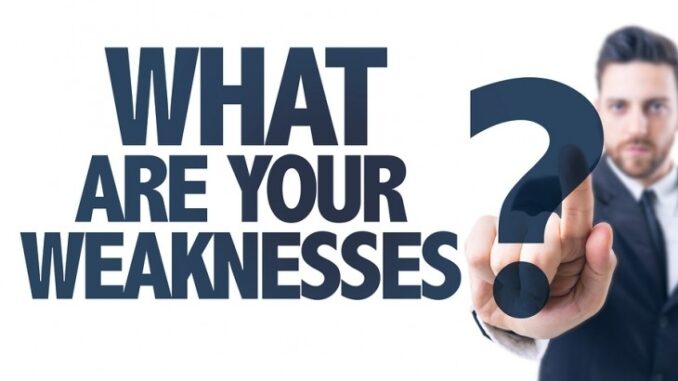
When prepping for an interview, you not only have to be prepared to explain how your work experience qualifies you for the position you want, but you should also have answers ready for questions that don’t directly pertain to the job. It’s common practice now for employers to ask questions that are behavioral-based to better gauge how a candidate will act when faced with certain situations. One of these questions that no one is a fan of is the classic, “What are your weaknesses?”
While you may feel uncomfortable discussing your vulnerabilities with someone you’ve just met who will determine whether or not you’ll be hired, answering this question correctly is actually very important. In fact, every question an interviewer asks is important, so don’t brush off a question with a half-hearted answer just because you don’t understand its relevance. Treat it like any other interview question and realize there are answers you want to focus on and answers you want to avoid at all costs.
Here’s the do’s and don’ts of answering the question, “What Are Your Weaknesses?”
Do: Put thought into it
Even if you’re prepared for the question, take the time to consider what your weaknesses are and which you should share in this moment. Give some serious thought to it and be honest with your answer. Consider the points that were already discussed in your interview and how you can tie your answer in with that.
Don’t: Blurt out the first thing that comes to your mind
Rushing this answer may show your interviewer that you don’t take the question seriously and are just looking to move on to the next question. Giving an answer too quickly may also give off the impression that you just picked something at random and are lying. It may be uncomfortable, but being honest with your potential future employer is the best way to go.
Do: Make your answer relevant to the job
If you can, choose to talk about a weakness that pertains to a skill or responsibility the job requires. It’s okay to admit you don’t have all the skills now, so long as you are willing to learn. Maybe you’re not very organized. Not everyone is. But so long as you can show that you still get the job done, you can prove that your weakness isn’t hindering the results you can provide.
Don’t: Use cliche weaknesses
Some candidates use this question as an attempt to make themselves look good by pretending to be humble about it. “My weakness is that I work, too hard,” or “I’m a perfectionist,” are some cliches that get used repeatedly for this question, and they’re all BS. What’s more, the interviewer knows it. As I said before, genuine and honest answers work best. You’re not impressing anyone by trying to turn your weakness into a strength.
Do: Give examples of growth
If you’re determined to avoid looking vulnerable in admitting what your weaknesses are, do so in a way that shows you’ve made progress to overcome it. If your weakness is that you tend to work alone and don’t delegate responsibilities (trust issues), then talk about that and how you’ve tried to break out of your comfort zone by assigning small tasks to your team.
Don’t: Turn your interview into a therapy session
When your interviewer is asking, “What are your weaknesses?” he or she isn’t interested in your personal life. Don’t bring up weaknesses that aren’t linked to your professional career. The company isn’t interested in your inability to commit to a relationship or a problem you may have with food, alcohol or drugs. Your personal life is private. Keep your answer focused on your professional life.
Having weaknesses doesn’t make you unqualified for the position. Everyone has them. It takes strength to admit your vulnerabilities and bravery to overcome them. Employers know this when they ask these questions so be prepared to show your strength and bravery by admitting a weakness. They won’t think any less of you for being honest.
